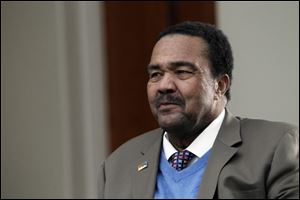
Ford rips voting changes
Councilman declares procedures are undemocratic
3/24/2014
Councilman Jack Ford says some of the state-ordered changes in voting procedures are aimed at sup- pressing minority voting in Ohio.
Toledo Councilman Jack Ford on Monday said some of the state-ordered changes in voting procedures are aimed at suppressing minority voting, and he encouraged people to support enshrining voting provisions in the Ohio Constitution with the Ohio Voter Bill of Rights.
“I have watched the legislature for many years as well as serving in it for seven, as well as becoming one its leaders, and I have never seen the kinds of tactics being used to curtail the vote as I am seeing right now,” Mr. Ford said. “It's not only harmful to some of Ohio's citizens, but it is shameful.”
Mr. Ford said there have been “undemocratic” and “racist” efforts to suppress votes.
“It's targeted to black voters and it is a view or fear that Republicans can't win Ohio without somehow or other diluting the minority vote,” he said.
Earlier this month, a group working to write a Voter Bill of Rights into the Ohio Constitution was allowed to start gathering more than 385,000 valid signatures of registered voters needed to get the proposed amendment on the November ballot. The group must have the signatures by July 2 in order to qualify for the general election ballot.
Mr. Ford held a news conference Monday over the proposed amendment and was joined by Democratic councilmen Matt Cherry and Mike Craig; Ray Wood, president of the Toledo chapter of the NAACP; the Rev. Cedric Brock, president of the Interdenominational Ministerial Association and a pastor at Mt. Nebo Baptist Church, and the Rev. John Roberts, pastor of Indiana Avenue Missionary Baptist Church.
The amendment would reverse some legislation enacted by Ohio's Republican-controlled General Assembly. It also would set minimum days and hours for early voting, authorize electronic voter registration, provide more options for voter identification at the polls, and set less stringent rules for counting provisional ballots.
Under the new laws, the window for absentee and in-person early voting is reduced from 35 days to 29 before the election, new restrictions are placed on absentee ballots and last-resort provisional ballots, and no public official except the secretary of state may mass-mail applications for absentee ballots.
Chris Schrimpf, spokesman for the Ohio Republican Party, said it was a Republican secretary of state and legislature that enacted Ohio's early voting law in 2005, and that Democrats have "been quick to look for partisan advantages at the expense of Ohio voters."
"Republican leadership has made Ohio one of the easiest and most fair states to vote in," Mr. Schrimpf said.